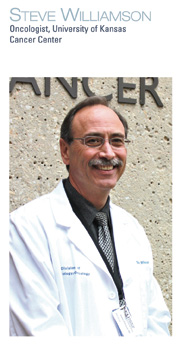
Nearly 20 years after discontinuing the liver-transplant program at Saint Luke’s Hospital, administrators decided to reverse course. A lot can change in medicine in two decades, so they needed someone with the credentials to build a top-tier team and department. And that is what brought Henry Randall to Kansas City.
A son of Detroit who earned his medical degree at hometown Wayne State University, Randall had worked with some of the best in the field at stops in San Francisco, Louisville and Dallas. As the new director of Saint Luke’s abdominal transplantation and hepatobiliary surgery department, this venture would have his fingerprints all over it. The hospital “offered a blank slate in terms of being able to build a program, it had the services and the need, and the organ-procurement organization is a very busy, productive OPO,” he said. The Kansas City region has been a net exporter of transplant patients to such locales as Barnes-Jewish Hospital in St. Louis or the Mayo Clinic, but “there’s absolutely no reason for that now,” Randall says.
Randall, an associate professor in the surgery department at UMKC’s School of Medicine, knew early on that he wanted to be a surgeon. He came to this particular line after an ah-ha! moment in a medical school immunology course. “I was sitting in class, reading about this wonder drug, cyclosporine, and we started discussing transplantation immunology,” he recalls. “My light bulb came on. That was 1982, and from that point on, I was bound and determined to be a transplant surgeon.”
His work pays powerful emotional dividends: “To offer patients another opportunity at life, especially with liver transplant surgery,” he said, is the greatest satisfaction he derives. A prime example of that was a woman in Dallas who had made out her living will in anticipation of her fate. “We operated on her, it was a large cancer, but that put me on record as the fastest liver transplant at Baylor—exactly two hours.” She’s still alive today, back on her job as an engineer, Randall says, and “doing extremely well. There are lots of stories like that.”

Great doctors are known for their tremendous passion. Sometimes, it burns white-hot. Going back to his residency, Steve Williamson recalls a young patient with Down syndrome, in intensive care for sepsis. Another doctor, declaring the case a lost cause, refused to perform a vital procedure and suggested the boy be left to die. “I was so upset and had to be physically restrained,” Williamson remembers. But his passion sufficiently impressed the surgeon, who fulfilled his duty.
“Caring for these patients has taught me that every human being, no matter how disabled, has a quality of life they are happy with and their families love helping them to achieve,” Williamson says. “It taught me that I need to get to know enough about my patients so that I can help them to maintain their life as best they can.”
Decades later, he has moved to oncology. The war on cancer is fought on many fronts far from the patient’s bedside, and Williamson attacks on all of them: Through treatment and clinical research, in the classroom
teaching the next generation of oncologists, or addressing colleagues at conferences around the nation. A professor of medicine within the Department of Medicine at KU Med, he has dedicated his life to helping other people extend theirs.
With demands like that on his time, he laments the distractions that many doctors face today, like haggling with third-party payers over the rationale and justification for ordering certain tests or treatments. “I see many patients with rare and unusual malignancies for which there are no standard treatments,” he says. “This can be very frustrating and time-consuming.”
Ironically, the Wichita native found fulfillment in a field fraught with sorrow. Early apprehension over his career path gave way to something else when he was first exposed to oncology. “After my first week, my wife noticed that I was happier and loved the service,” he recalls. “The patients are frightened, many are very ill, and at that time, many had limited treatment options, but clinical research was starting to take off.”
That allowed him to practice the science and the art of medicine, and his research seeks answers to vital questions “and perhaps influences the care of thousands of patients, not only the one patient I am seeing at any particular time,” he says.
Return to Ingram's September 2011